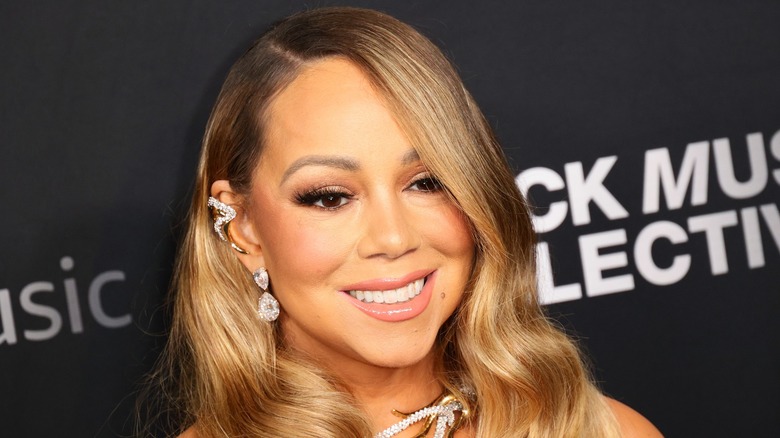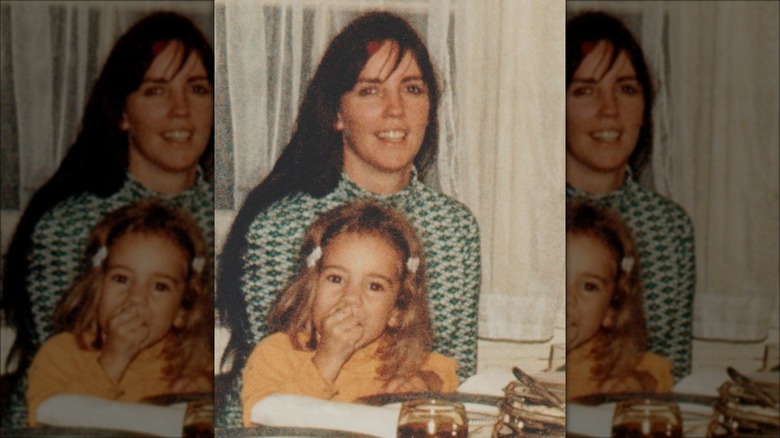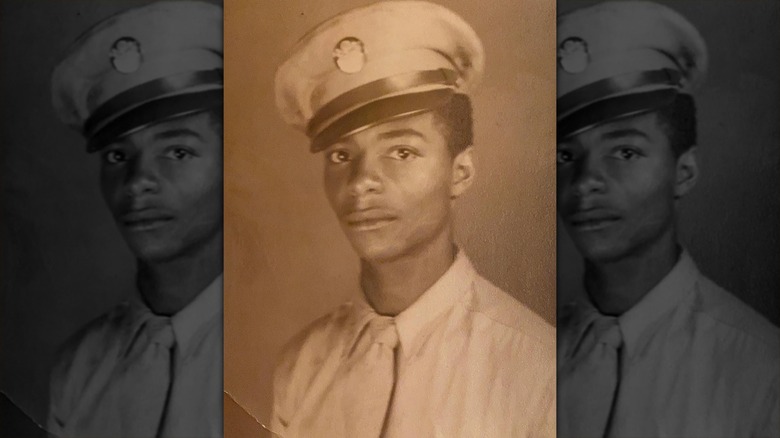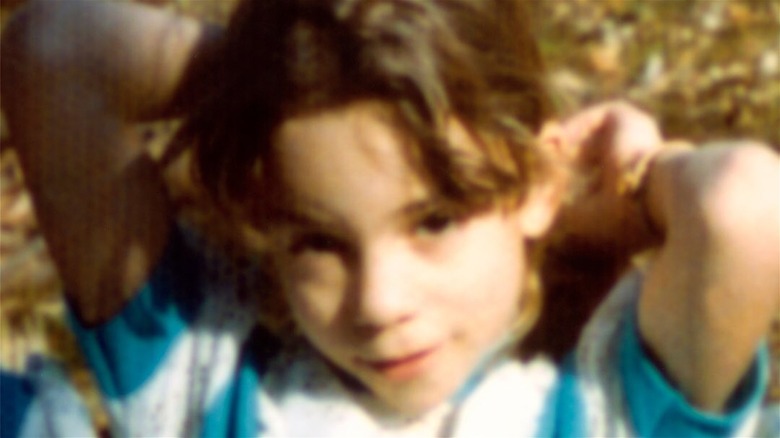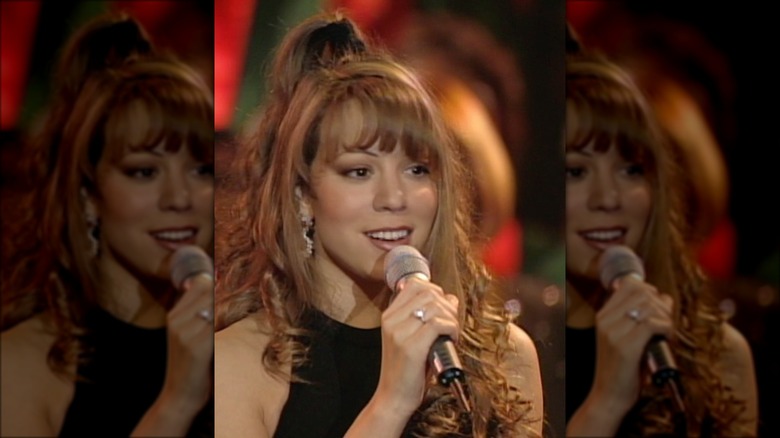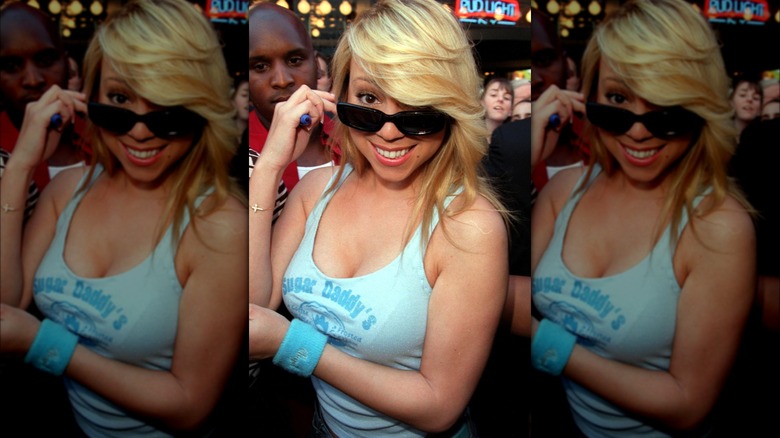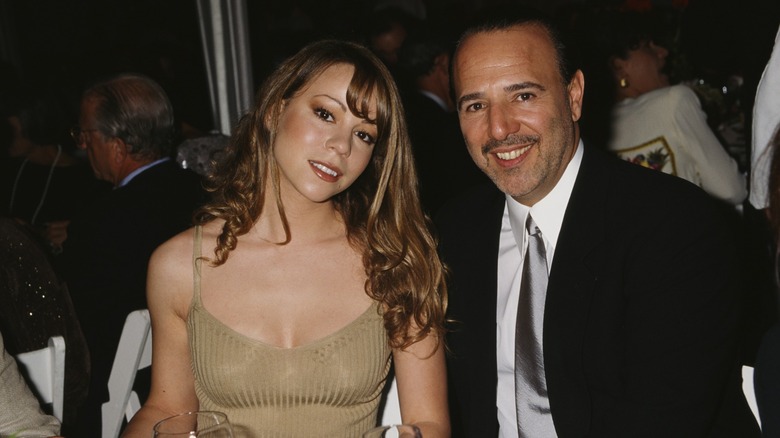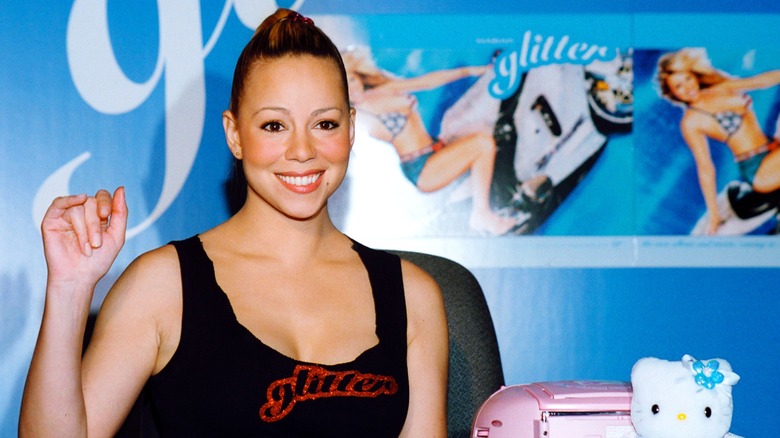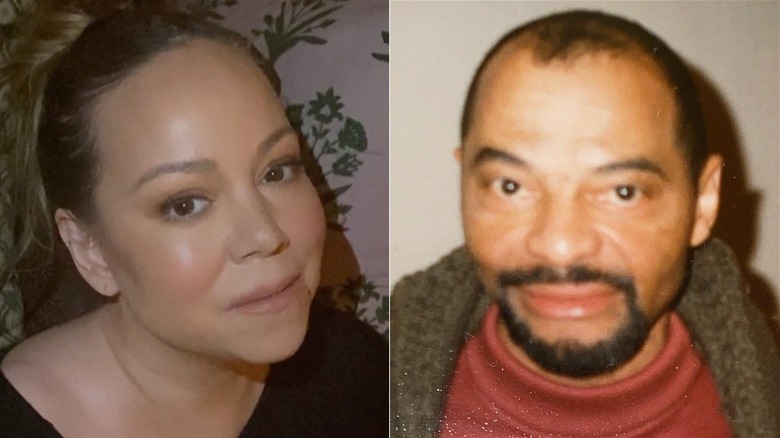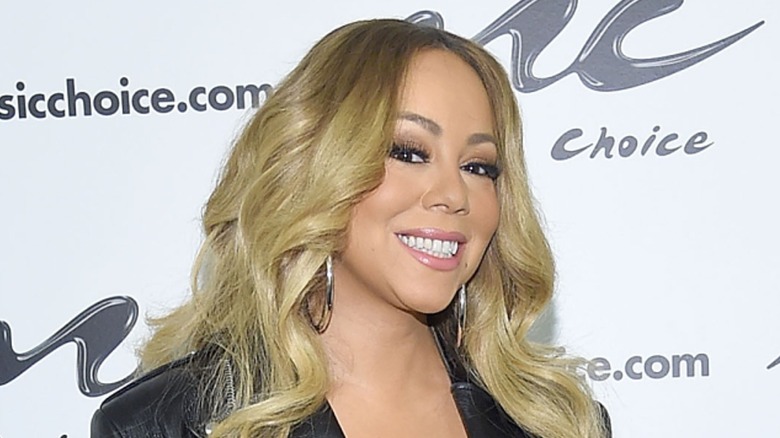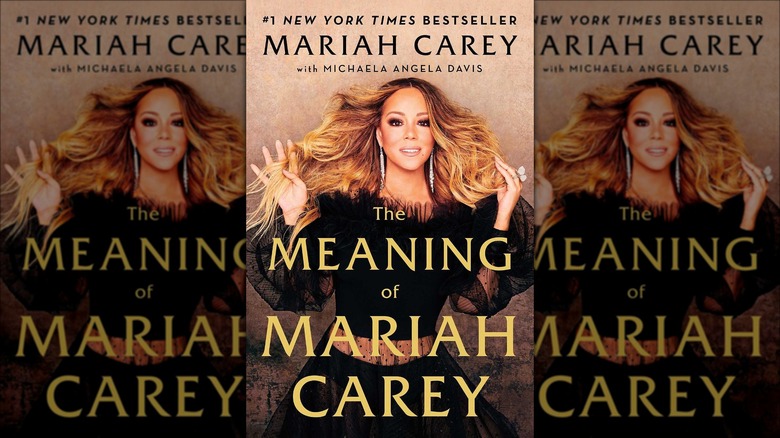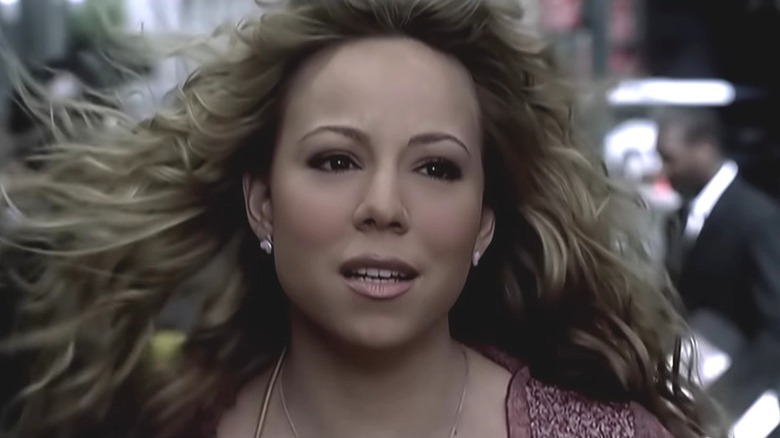Mariah Carey's Tragic, Real-Life Story
The following article contains references to domestic violence and drug use.
Mariah Carey is one of the most successful female artists in the history of music, but it's no secret that, at times, she's led a very difficult life. She confessed as much in her memoir, "The Meaning of Mariah Carey," reflecting on the way she had to grow and heal from so much early tragedy. In fact, she believes that her history of trauma is exactly what allows her art to be as powerful as it is. "I have seen, I have been scared, I have been scarred, and I have survived," she wrote. "I have used my songs and voice to inspire others and to emancipate my adult self."
We all know how "The Emancipation of Mimi" went — 14 weeks at #1 for "We Belong Together," thank you very much, dahling! — but what about those other parts of Carey's life? There was a troubled childhood, one that saw her neglected by her parents and abused by a sibling. There was her marriage to Tommy Mottola, who exercised control over both her career and her personal life. There was that much-publicized breakdown on "TRL," the colossal failure of "Glitter," and several heartbreaking losses.
Despite all she's been through, she keeps singing. In the epilogue of her memoir, Carey shared some wisdom. "If I have learned anything in this life worth sharing, it is, protect your dreams," she wrote. "Even in the face of disadvantages and dysfunction, you can't let anybody define, control, or take away your vision of your life."
Mariah Carey and her mother had a tense relationship over the years
Mariah Carey's mother, Patricia Carey, was an opera singer, and that's part of where little Mariah picked up her love of music. "As I listened to her doing vocal exercises at home, the repetition of the scales felt like a mantra, soothing my frightened little mind," she wrote in "The Meaning of Mariah Carey."
Unfortunately, though, after her parents divorced, Mariah's relationship with Patricia became strained. She became resentful of the fact that her mother brought dangerous men around the house, and she grew to feel that her mother should have protected her better from her abusive siblings.
Furthermore, and perhaps most damagingly, Patricia seemed jealous of the young Mariah's budding talent. In one section of her memoir, the "Heartbreaker" songstress wrote about an incident in which her mother snapped, "You should only hope that one day you become half the singer I am." That made Mariah very self-conscious about her own talent, and her mother's words never really left her. "Having people you love be jealous of you professionally comes with the territory of success, but when the person is your mother and the jealousy is revealed at such a tender age, it's particularly painful," she wrote. "I was going through some heavy s*** then, and for her to expose her insecurity to me in that way, at that time, was damaging." The two would fall out and make up many times over the ensuing decades.
Mariah Carey's relationship with her father was strained
Mariah Carey's mother wasn't the only parental figure that turned out to be a complicated one. She wrote in "The Meaning of Mariah Carey" that she struggled under the watchful eye of her father, Alfred Roy, who was extremely strict. He was a military man, and when Carey spent weekends at his house, he would run his home very intensely. "My father's approach to most things was efficient and militaristic," she wrote in "her memoir." If she was hungry between meals, he would feed her one single Ritz cracker, and he once made her repay him $0.50 when he bought her ice cream.
Often, when Carey and her brother were with their father, things got violent. "A shouting match became a tornado of fists in what seemed like a matter of seconds, banging through the room, knocking things over, and leaving havoc in its wake," she recalled. "In that moment, the rage between my father and brother was so forceful that no one person could have stopped it."
As Carey grew up, her regular visits with her father stopped, and she didn't see him for long stretches of time. They would become fully estranged in adulthood, and Carey considered him absent. "I was determined to rise above my conditions," she wrote in her memoir. "I was going to rise above it all — even if that included my father."
If you or someone you know is dealing with domestic abuse, you can call the National Domestic Violence Hotline at 1−800−799−7233. You can also find more information, resources, and support at their website.
Mariah Carey's relationships with her siblings were traumatic
Mariah Carey's strained relationships with her parents weren't the only ones that proved to be a formative, early trauma. In "The Meaning of Mariah Carey," she opened up about her strained relationships with her siblings, sister Alison Carey and brother Morgan. Her brother frequently fought with her father, meaning their household was often filled with violence. "I always thought of my brother's anger as weather — powerful destructive, and unpredictable," she wrote in her memoir. "I don't know if it was a singular act or an ongoing illness that made him so volatile, but it was all I had ever known." Sometimes, the police were called to their home, frightening the young Mariah even more.
Alison, too, made the future singer feel unsafe all throughout her childhood. In her memoir, Mariah described a shocking incident in which her sister attempted to sell her, physically wounding her in the process. "When I was twelve years old, my sister drugged me with Valium, offered me a pinky nail full of cocaine, inflicted me with third-degree burns, and tried to sell me out to a pimp," the "Vision of Love" singer recalled, revealing that she'd been afraid to tell anyone what happened for many, many years.
"Something in me was arrested by all that trauma," Mariah concluded, admitting that she feels forever young because of what happened to her. "I am still struggling through that time."
If you or anyone you know has been a victim of sexual assault, help is available. Visit the RAINN website or contact RAINN's National Helpline at 1-800-656-HOPE (4673).
Mariah Carey faced racism as a kid
As the daughter of a white mother and a Black father, a young Mariah Carey often faced racial abuse at the hands of people who didn't like that she came from an biracial family. In "The Meaning of Mariah Carey," she described those early experiences in a characteristically poetic fashion. "My first encounters with racism were like a first kiss in reverse: each time, a piece of purity was ripped from my being," Carey recalled. "Left behind was a spreading stain, which seeped so deeply inside of me that to this day, I've never been able to completely scrub it out."
Carey recalled other kids at school laughing at her when she drew her father, and her teacher even joined in, telling her she'd used the wrong crayon when she colored in his skin. Some kids refused to play with her because of her identity, and others weren't allowed to.
In a 2005 interview with Parade, Carey opened up further about what those experiences were like, recalling times when people stopped her and her father in the store to ask where her mother was, refusing to believe that a Black man could have a kid who looked like her. "The fear, the sense of inadequacy, the feeling of not being fully accepted," she said, "I felt all that."
In 2001, Mariah Carey's erratic behavior caused major concern
In June 2001, Mariah Carey made pop culture history when she appeared on an episode of "Total Request Live." She was promoting "Loverboy," the first single from the "Glitter" soundtrack, and when she stepped out onto the "TRL" stage, she seemed ... not quite right. She handed out ice cream in an oversized t-shirt, going on about rainbows and swimming. Carson Daly looked right into the camera and told viewers, "Mariah Carey's lost her mind" (via The Daily Beast).
Carey maintains in "The Meaning of Mariah Carey" that the "TRL" appearance was a stunt that went sideways, but the resulting backlash turned that time in her life into a very real tragedy. "It was the first time I had experienced the phenomenon of a public fail that woke the monster in the media," she wrote, "that vicious vampire that gains its strength by feeding on the weaknesses of the vulnerable. The bombed stunt mushroomed into a big, nasty, never-ending story."
Soon, Carey was leaving concerning voicemails for her fans online. "I don't say this much but guess what, I don't take care of myself," Carey confessed in one. Later that month, her publicist told MTV that she'd been hospitalized for exhaustion. Weeks later, her team told the Associated Press, "She has suffered an emotional and physical breakdown ... she is under psychiatric care" (via Billboard). Carey recovered, but it would be a long time before her public image did, too.
Mariah Carey felt 'locked away' during her marriage to Tommy Mottola
If there's one tragic thing about Mariah Carey's life that any fan knows, it's the sad situation she experienced trying to get away from her marriage to record exec Tommy Mottola. He was the one who discovered her, and within the first few years of her career — and despite their significant age gap — they were married.
Carey described the suffocating marriage on Meghan Markle's Spotify podcast, "Archetypes." "I was kind of locked away and I was sort of, you know, given the rules and had to stick with them," she said. In her memoir, "The Meaning of Mariah Carey," she revealed that she was never happy with Mottola, who, it seemed, was given to anger. "In the beginning of our time together I was walking on eggshells. Then it became a bed of nails, and then a minefield," she wrote. "I never knew when or what would make him blow, and the anxiety was relentless."
As the marriage fell apart, Carey suspected that Mottola sabotaged her career. Eventually, an affair with Derek Jeter helped break the hold that Mottola had over his wife. She later told Oprah Winfrey on "The Oprah Conversation" that Jeter was the first time she let herself believe she could change her circumstances (via Us Weekly). "He was a catalyst that helped me get out of that relationship," Carey recalled, "because I believed that there was somebody else [out there for me]."
She released Glitter on 9/11 – and blamed her dismal sales on the attacks
After Mariah Carey recovered from her highly publicized hospitalization, she dove full-force into promoting "Glitter." The film and its accompanying soundtrack were meant to launch Carey's career into the stratosphere, cementing her as an acting powerhouse in addition to a strong vocalist. Instead, the film received a critical ravaging; it sits at a mere 6% fresh on Rotten Tomatoes. The box office wasn't much better. The movie grossed about $4.3 million against a $22 million budget, according to BoxOfficeMojo.
However, while Mariah Carey was grappling with one of her most tragic career moves, the country was dealing with tragedy on a different scale. Yes, that's right: The "Glitter" soundtrack was released on September 11, 2001. "The coincidence of my sudden release from 'rehab' and the release of the 'Glitter' soundtrack and the 9/11 attacks was haunting," she later wrote in her memoir. "You know how, in a sci-fi horror film, the apocalypse happens and then there's a lone survivor wandering around surveying the devastation? That was me on that warm and cloudy day in LA."
While it may seem tasteless to blame a terrorist attack for the failure of a popstar's vanity project, Carey maintains it was responsible. She wrote, "The box-office sales for 'Glitter' were dismal, in large part because the country was still reeling from the 9/11 attacks. The tragedy was still fresh, and no one was ready for the lightweight distraction that was 'Glitter.'" Girl ... I guess!
Mariah Carey's father died of cancer
Though Mariah Carey and her father Alfred Roy were estranged for part of her life, she was by his side in 2005 when he was dealing with bile duct cancer. Carey was recording her album "Charmbracelet" in Italy at the time, but she flew back and forth regularly to New York, spending as much time as she could by his bedside.
In her 2020 memoir, Carey showed her father grace, trying to understand why he'd raised her the way he did. At the end, all of those old resentments fell away. "This was hard stuff for a little girl, and I felt so alone — but it wasn't ever his fault," she wrote. "We both needed things we didn't know how to give. I believe deep down my father understood why I had to delve into my music and break away form my family — it was my survival, my identity, my reason to exist."
After he died, Carey wrote a song for him called "Sunflowers for Alfred Roy," and she included it on the album that she was recording when he fell ill. "Please be at peace father / I'm at peace with you," she sang. "Bitterness isn't worth clinging to / After all the anguish we've all been through."
Mariah Carey was diagnosed with bipolar disorder
Mariah Carey's childhood was quite difficult, and as she grew into an adult, she found herself still extremely affected by the trauma she'd gone through thanks to her unstable upbringing. In 2018, Carey came forward with her bipolar diagnosis, which she said she'd received back in 2001 when she was hospitalized. "I was irritable and in constant fear of letting people down," she told People, recalling long sleepless nights. "It turns out that I was experiencing a form of mania. Eventually I would just hit a wall."
In an interview with The Guardian, she explained that she has come to believe that her current mental health struggles stem from her childhood. "It was a combination of being biracial and experiencing the darker side of life," she said, noting that she struggled to figure out who she was as a result.
Carey told People that, for a long time after her diagnosis, she refused to believe it was real. As a result, her decision to come forward almost two decades later wasn't an easy one. "Until recently I lived in denial and isolation and in constant fear someone would expose me. It was too heavy a burden to carry and I simply couldn't do that anymore," she said. "I sought and received treatment, I put positive people around me and I got back to doing what I love — writing songs and making music."
Mariah Carey's estranged siblings sued her over her memoir
For a long time, Mariah Carey refused to discuss the details of her estrangement with various members of her family. Her book, "The Meaning of Mariah Carey," however, changed all of that. For the first time, the "Emotions" singer gave fans a peek behind the curtain of her childhood, describing in excruciating detail what, exactly, her sister had done to her when she was little.
Alison Carey, perhaps understandably, was quite upset with the book. In fact, in 2021, she sued her sister, alleging that her life had fallen apart since the book was released. "[She is] severely depressed and uncharacteristically tearful since the publication of defendant's book and now struggles, after a long time clean, with alcohol abuse," her lawyers wrote (via The Guardian). Furthermore, they said that in writing the book, Mariah had put her sister through "heartless, vicious, vindictive, despicable and totally unnecessary public humiliation."
Several months later, Morgan Carey filed his own lawsuit, accusing his sister of defamation. Carey hit back at that one in court, claiming that her intent was merely to inspire others. "The story of Ms. Carey's rise from a dysfunctional and sometimes violent family environment has significant public value, particularly to any young person who may find her/himself stuck in similarly harsh and dispiriting circumstances and who can benefit from the inspiration to employ their talents in pursuit of their dreams," her lawyers wrote (via Page Six) .
Mariah Carey lost her mother and her sister on the same day
In August 2024, Mariah Carey let her fans know that she had suffered two losses. Her relationship with her family had been strained throughout much of her life and on one fateful day, two separate relationships came to their end. "My heart is broken that I've lost my mother this past weekend," the "Without You" singer told People. "Sadly, in a tragic turn of events, my sister lost her life on the same day."
Thankfully, Carey was able to spend time with her mother before the end. "I feel blessed that I was able to spend the last week with my mom before she passed," she said. Sadly, the singer and her sister never patched things up. "We're told Mariah tried supporting Alison, both emotionally and financially, but it wasn't enough to get Alison back on the straight and narrow," TMZ reported after speaking with a source.
After Carey went public with the tragic news, the Lambs turned out in full force to support her on social media. "May they rest in peace!" one Swedish fan account wrote on X, formerly Twitter. "Sending love to Mariah & family in this difficult time."
